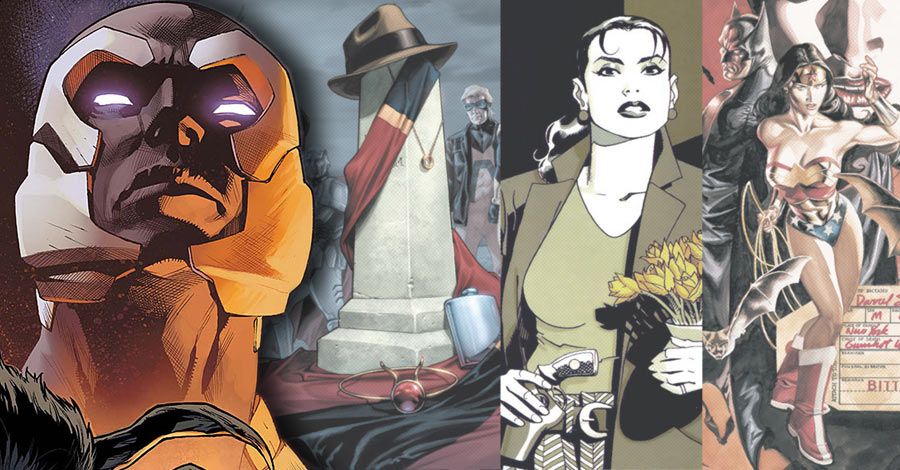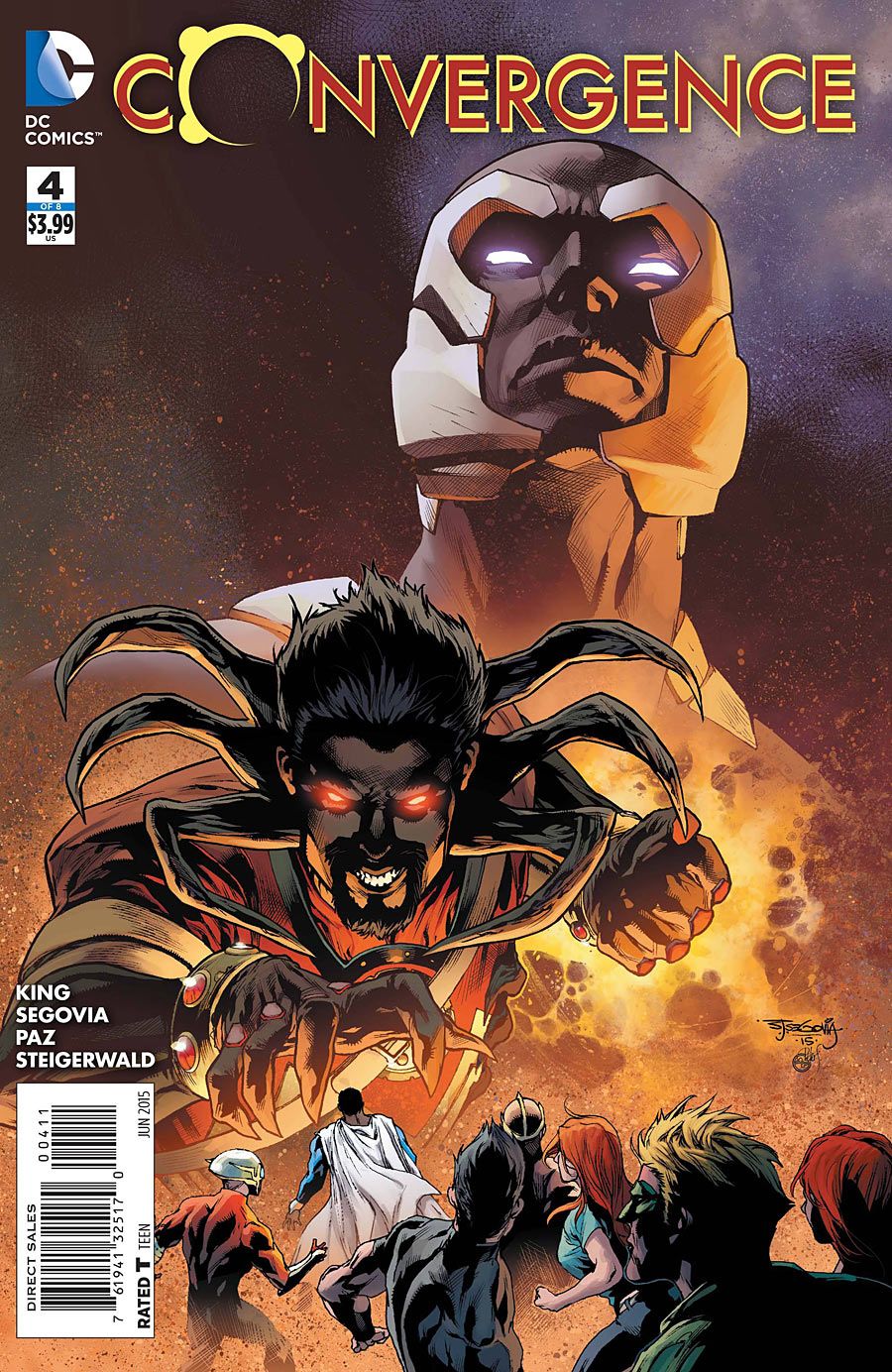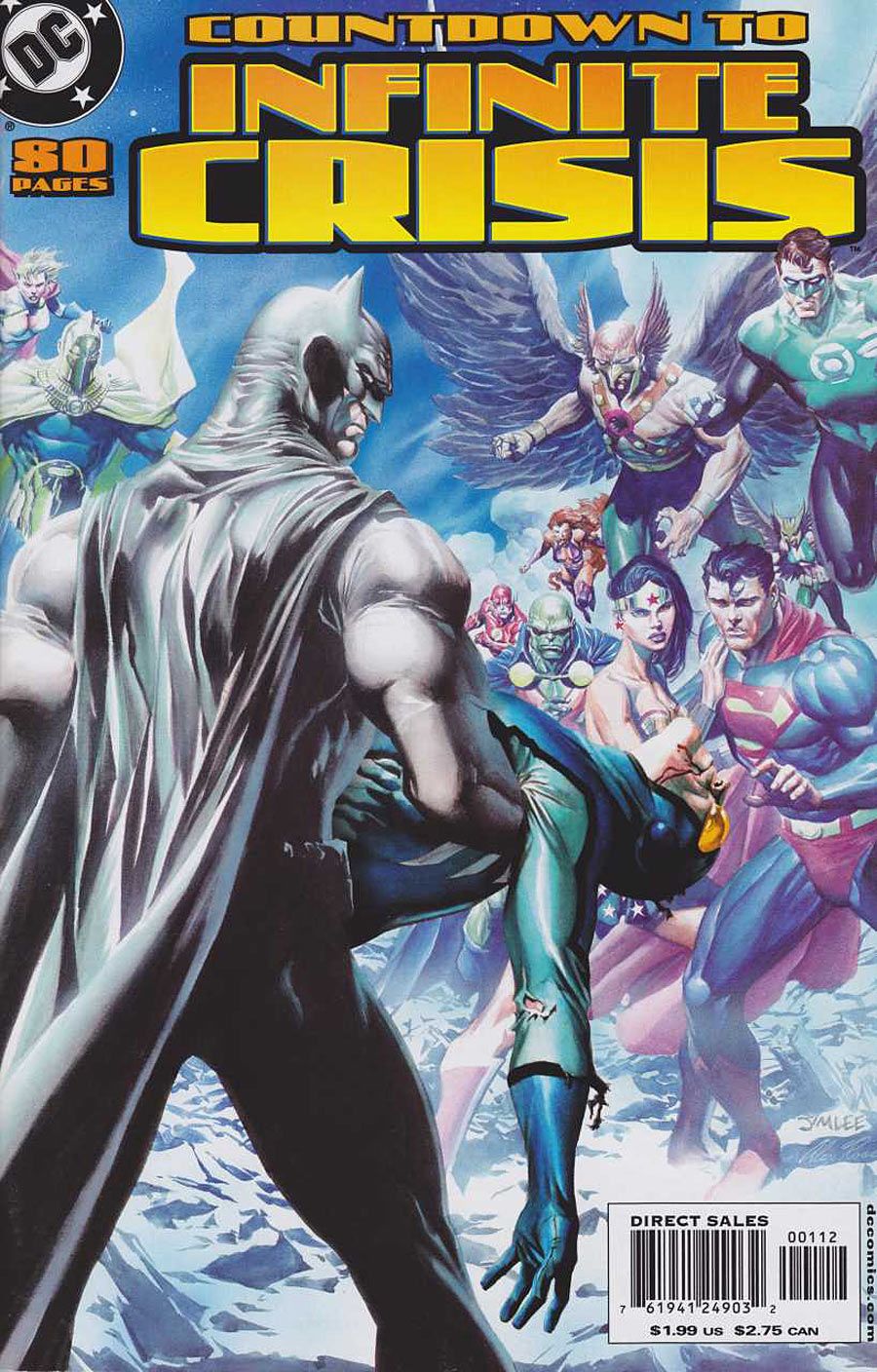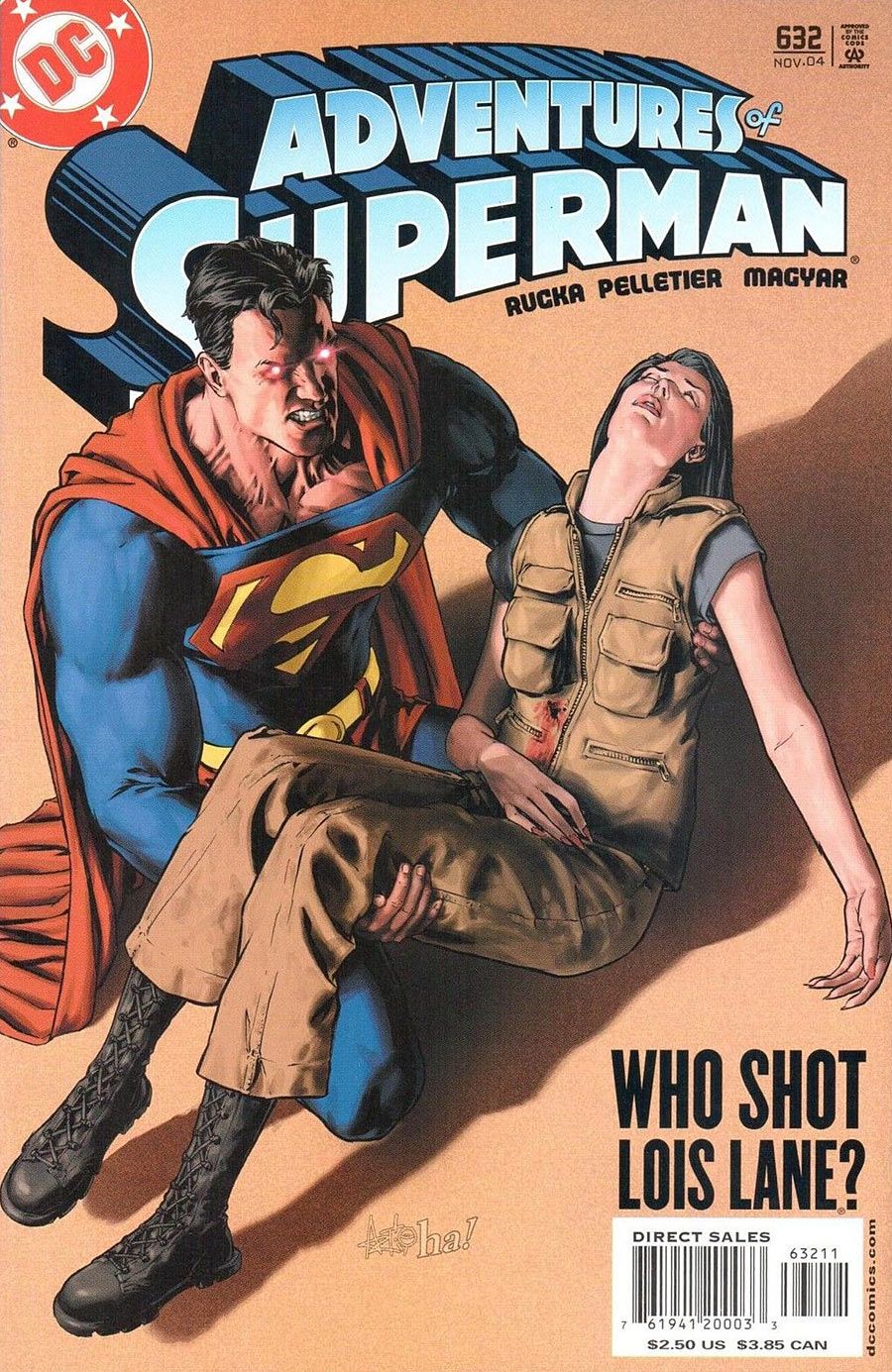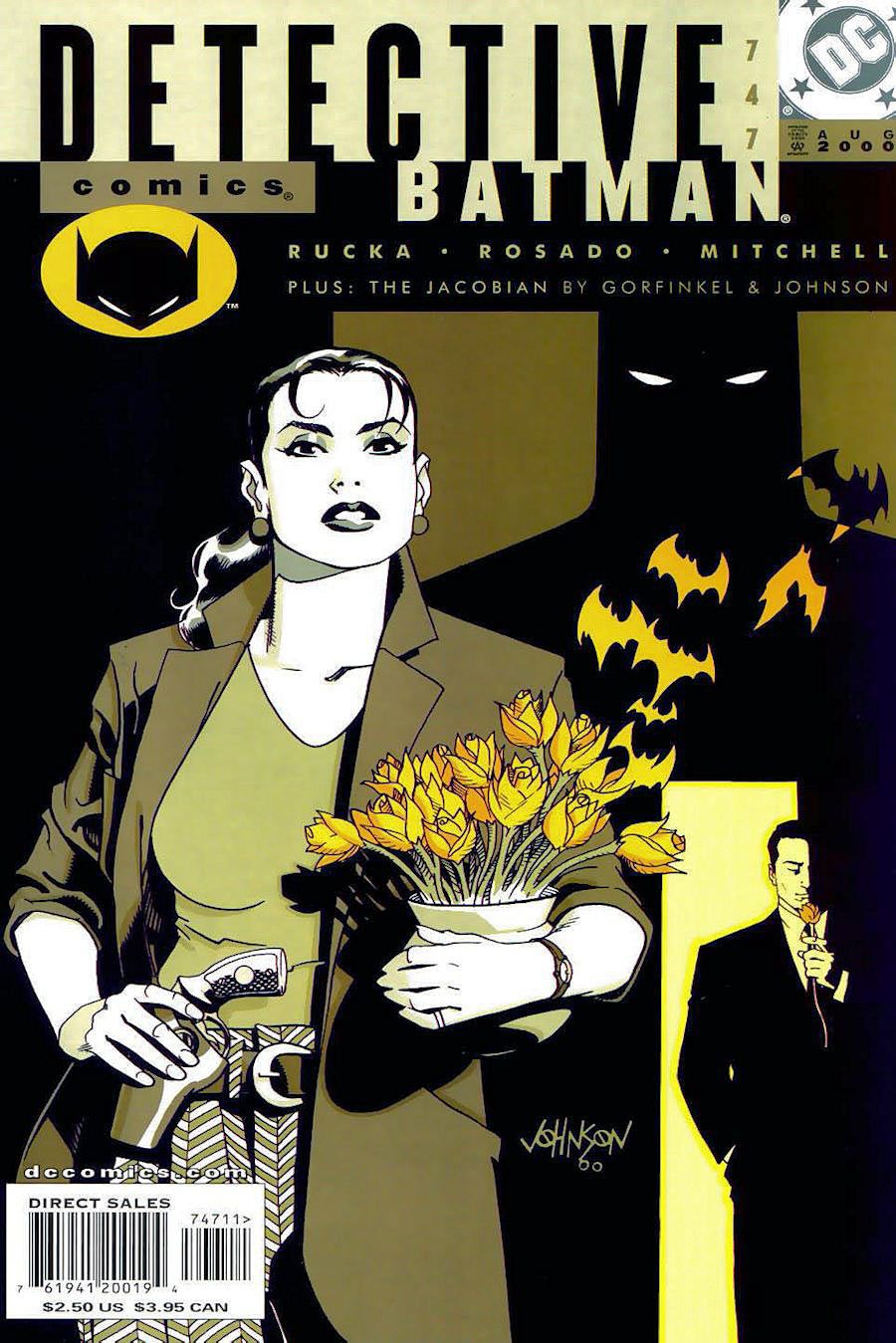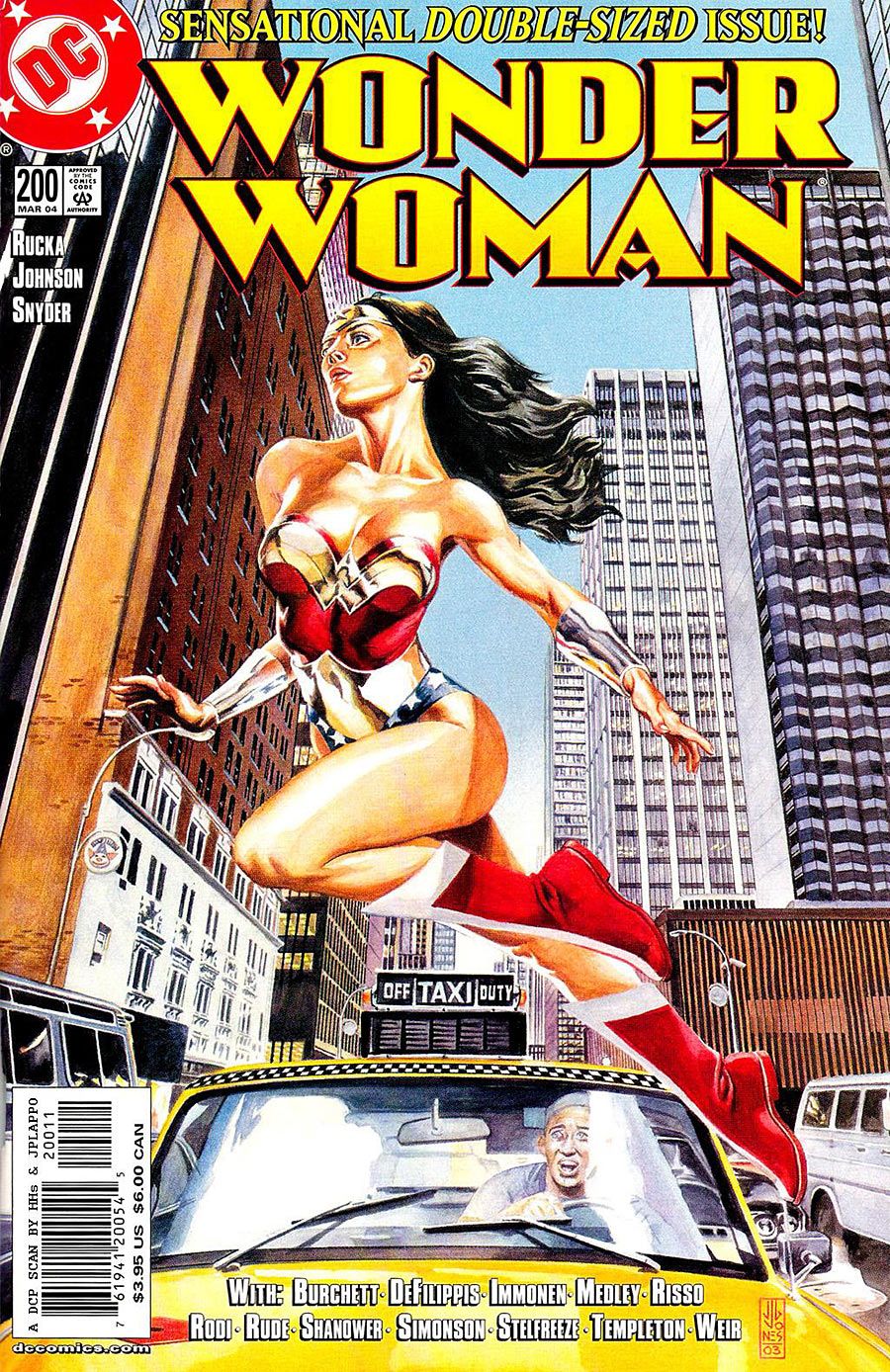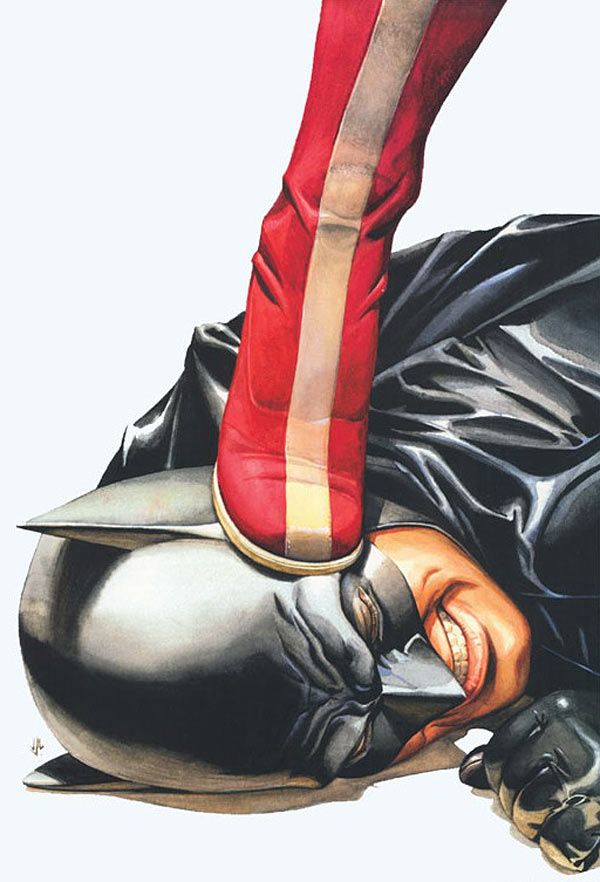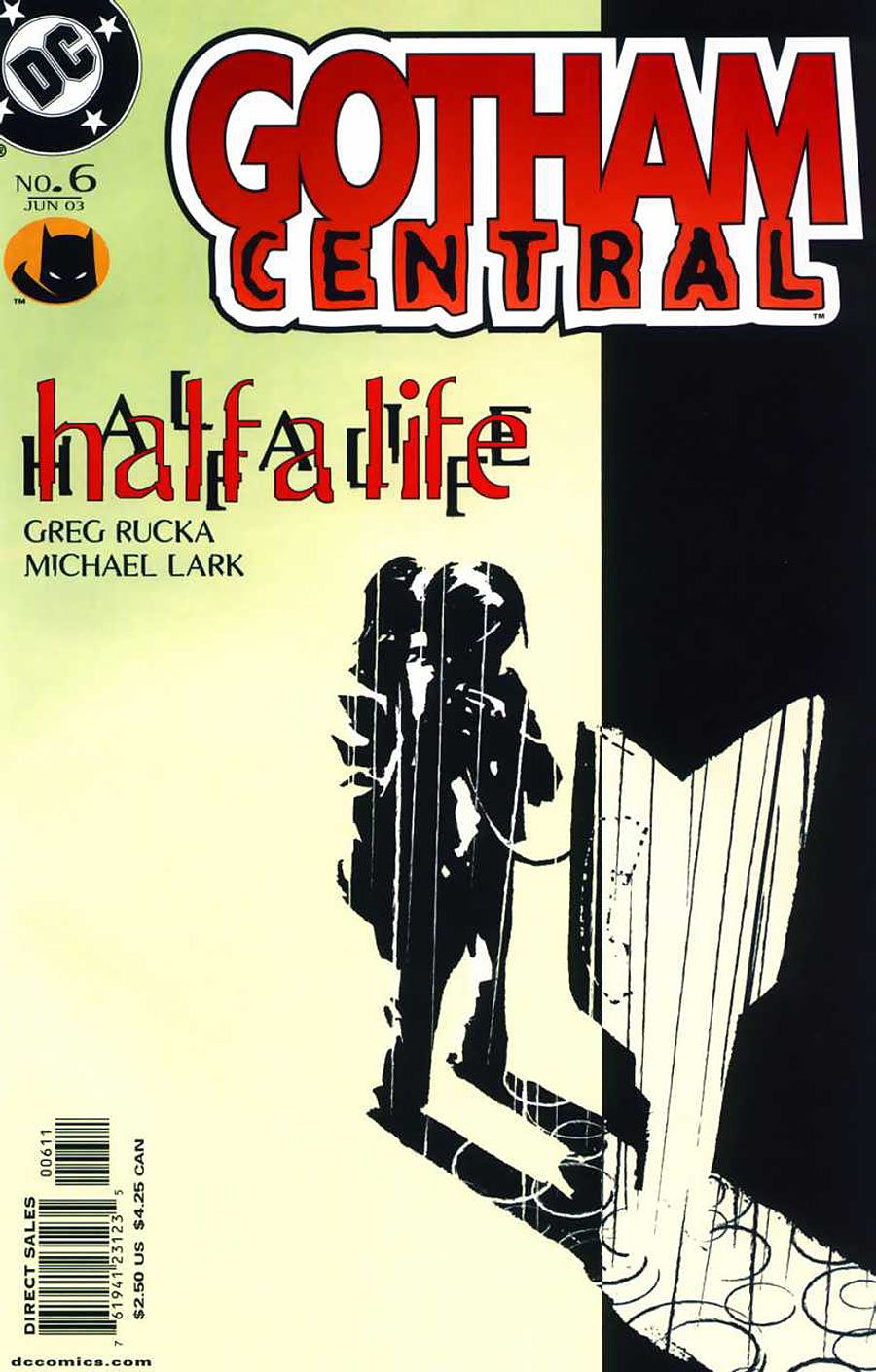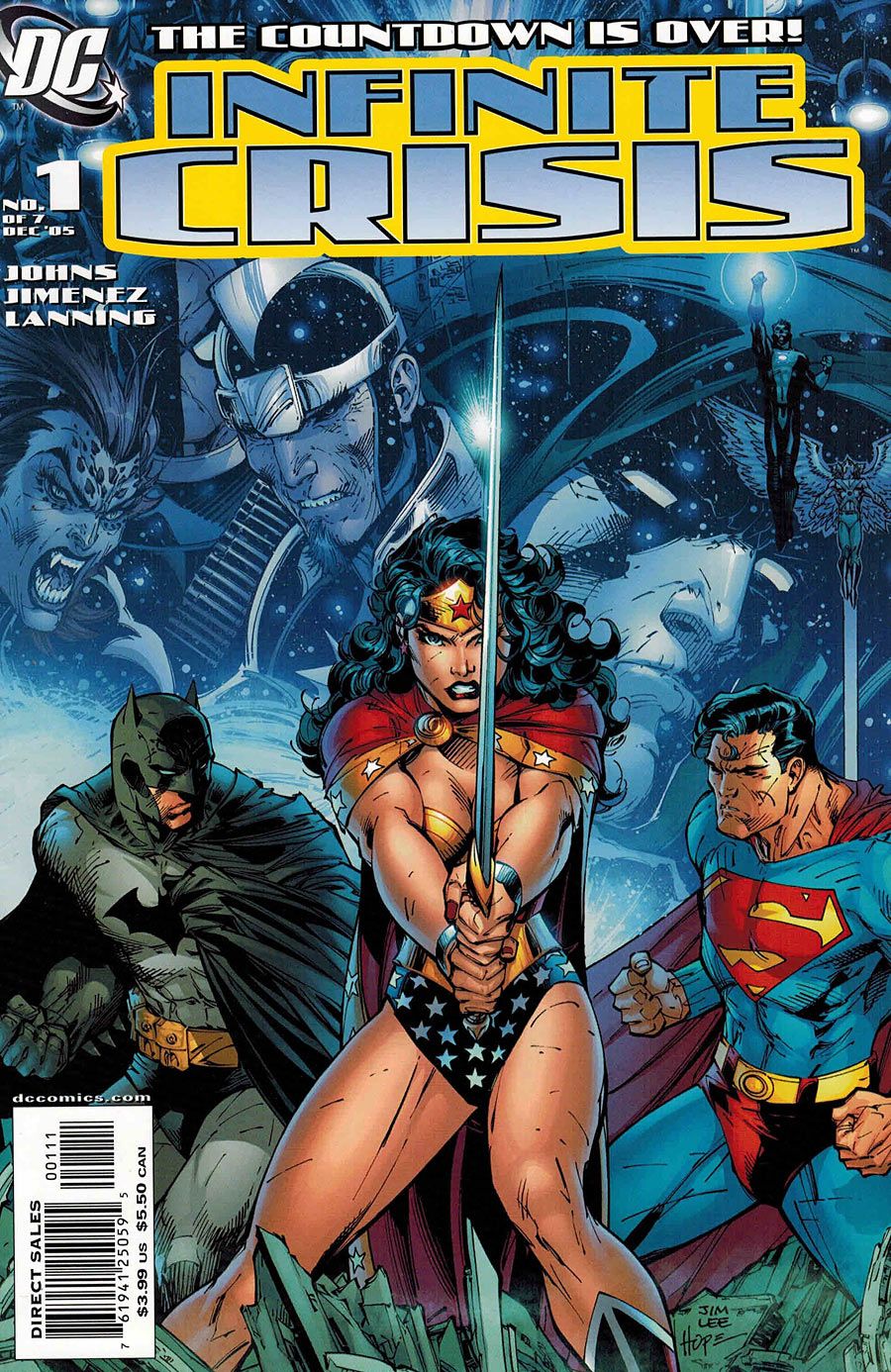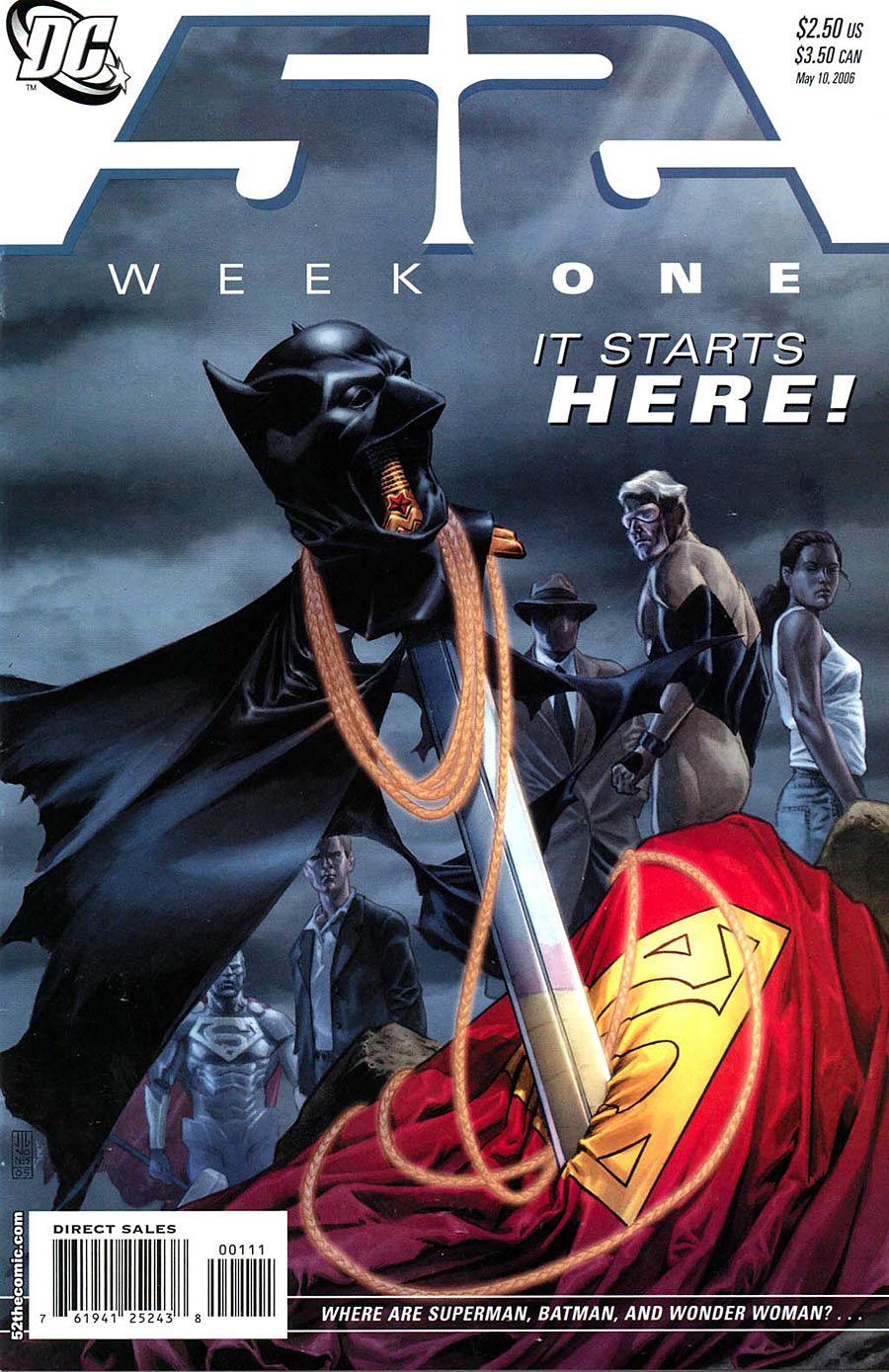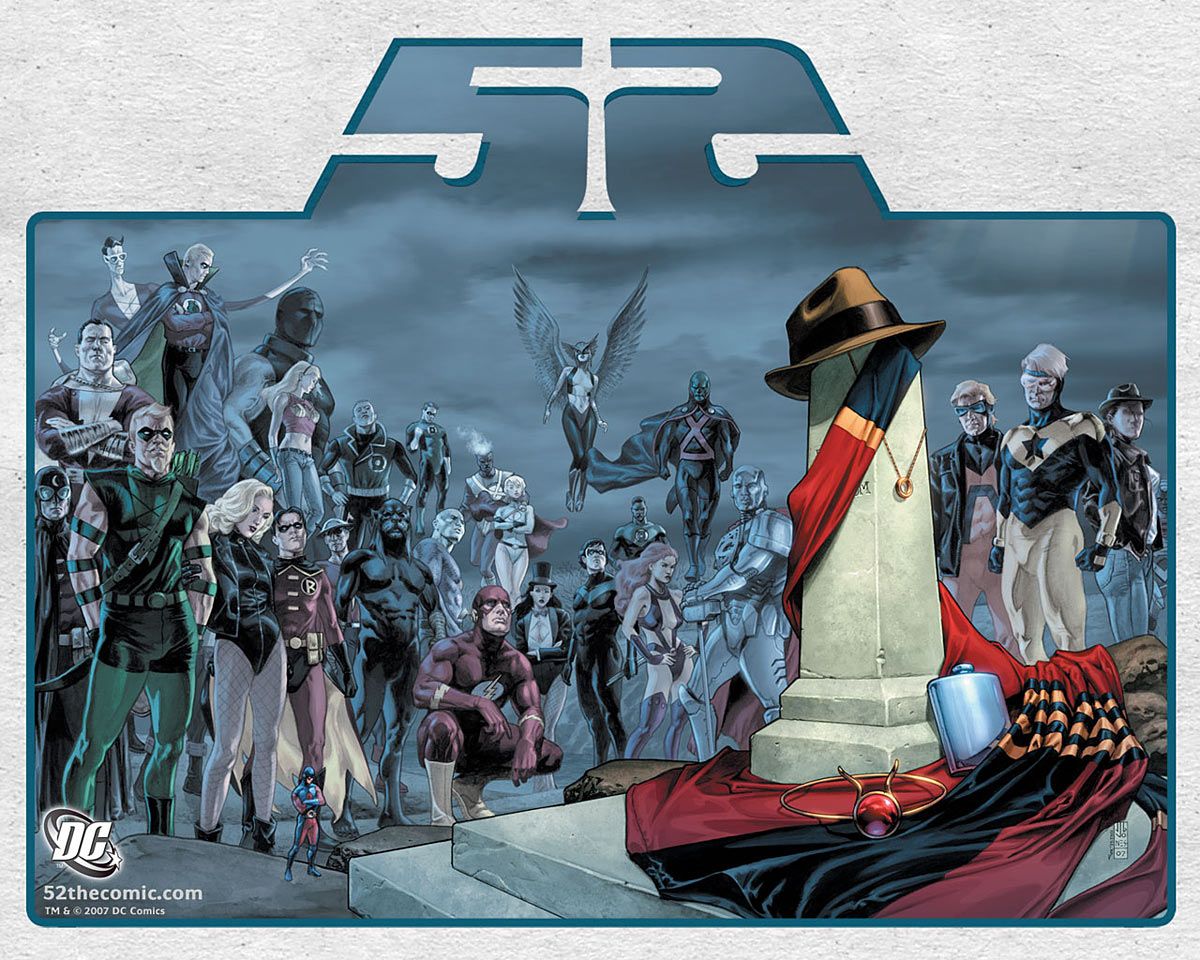Welcome to CBR's fourth and final installment of CONVERSATIONS OF CONVERGENCE with DC Comics Co-Publisher Dan DiDio.
As comic book readers, retailers, reporters and reviewers converge on DC Comics' event maxi-series, each week until the end of April, DiDio and CBR staff writer Jeffrey Renaud are discussing a specific decade from DC Comics' recent past, searching for answers about what drives an event like "Convergence."
For each conversation, Dan and Jeffrey are also joined by a comic book creator that was integral to the publishers' success during the decade in question.
CONVERSATIONS OF CONVERGENCE: DiDio & Jurgens on "Death of Superman," "Zero Hour," 1990s DC & More
This week, CONVERSATIONS OF CONVERGENCE looks back at the 2000s, a decade that featured the event maxi-series "Infinite Crisis" and DiDio and Renaud are joined by the acclaimed writer Greg Rucka, who worked heavily with DC's Trinity -- Superman, Batman and Wonder Woman -- and also co-created the Eisner Award-winning series "Gotham Central" with Ed Brubaker. Additionally, Rucka co-wrote the first of DC's weekly series, "52," with Geoff Johns, Grant Morrison and Mark Waid.
Check out the conversation with DiDio and Rucka via a video below, as well as a full transcript of the conversation.
CBR News: Dan, the last time we discussed "Convergence," we were joined by Dan Jurgens and we conversed broadly about DC Comics in the 1990s. This time around, we are joined by Greg Rucka and we are exploring the 2000s, or what the cool kids call the aughts. You arrived at DC Comics in 2002 so this is really your era. What was the state of DC Comics when you arrived and what did you set out to do when entrusted to lead this iconic stable of superheroes?
Dan DiDio: It's funny because all of these other conversations have been based on me as a fan and now I get to talk as a DC executive. When I was brought into DC, I was really brought in to really shake it up. There was a sense that things were moving through inertia and we really wanted to come in and examine our core characters and find a way to really bring a new point of view and a new energy and a new life to them.
You have to realize that I'm starting at DC right after September 11th, literally starting about two months after that so you're working in New York right after that tragic event and you still felt it. It was still palpable. We looked at how to bring the sense of urgency and how the world had changed to our books and I can never give enough acknowledgment to how much Greg was important to making us really bring, and drag, the DC Universe into a sense of relevance and importance during that period of time.
Wow. There you go. And Greg, during that time you worked primarily with DC's biggest superheroes: Superman, Batman and Wonder Woman. When tasked with taking on these iconic characters for the first time, do you take a big gulp and swallow your pride or do you dive in headfirst and say, "Yes. Of course, I can do a Batman story."
Greg Rucka: For my purposes, you have to be somewhat myopic because if you open up your view to big, you're going to get overwhelmed. If you look at any of the characters at DC -- and the Trinity characters in particular -- and they come with these awesome histories. There are so many stories that are so good and if you find yourself staring at them too long, you will psych yourself all the way out. It was always a question for me of trying to well, it's not original for me to say that I try and write from character. I think almost every writer would say that. It becomes a question of, "What am I seeing in this character?" Or where are those joints and articulations of the character that maybe have been overlooked or not, examined or not examined in the same way that I want to examine them in the past and try to find that way in?
Talking about these characters specifically, Batman was never difficult for me. Batman, I've always understood. Batman has always made sense to me. I get Bruce Wayne. That's a real easy character for me to slip into and I actually think that he is a character for a lot of writers, in that sense, he's not a cipher. We get him. What was interesting for me and this goes to what Dan was saying about the era and the relevance, we know Batman inside and out. I always found that he was far more interesting to me to be seen from the outside. To see him through other people's eyes was always more powerful to me.
CONVERSATIONS OF CONVERGENCE: DiDio & Wolfman on "Teen Titans," "Crisis," 1980s DC & More
Somebody like Superman, and in particular for Wonder Woman, it is much more challenging to try find takes on them that worked and that I felt were honest and honest to their histories. I spent the better part of two, three years who Diana was before I wrote word one but I feel that it was part of the job. And I love the fact, particularly in Diana's case, in that era, she was immediately a minefield because the character is political. And of all of the superheroes, at that point, her politics mattered. You couldn't run away from them and I felt very strongly that the weaknesses that had come before had been that people did. They were afraid of it.
What was it like? [Laughs] I don't want to swear but there were times I sat that late at night going, "Oh my God. Don't screw up." [Laughs]
DiDio: It's funny when Greg talks about Wonder Woman because I go back to "The Hiketeia" and some of just the strength of the character. And you are asking Greg about three characters but it wasn't the sense that he was working on just those three characters, he really, truly was integral on so many aspects of how the universe was working as a whole and that examination that he was talking about was actually integral to making the universe work as a unit because he took that same sense of dissection and understanding to how the universe worked and helped reassemble it. You saw that in all of the lead-ups we had going on at that period of time with the different series and also bringing that same sensibility that was so important to the "52" mix for the weekly series to.
Dan, you mentioned coming out of 9/11, was this level of storytelling what was required at that time? Did we need to get to really know these characters?
Rucka: Yeah, I absolutely think that one of the things that was certainly at work was -- and I am leery of using the word 'relevant' but I think the word 'grounded' is maybe better -- that there were human emotional touchstones for these characters. That there were points of connection that were sincere and I think one of the things that mainstream comics has been dealing with prior to that was that it was kind of insincere. It wasn't emotionally honest. It might have been true but we weren't seeing a lot of cause and effect and one of the things that I think, if I am going to pat myself on the back for anything that I did at DC, and man, I know that I pissed people off about this all of the time, but I wanted to know the cause and effect.
My biggest issue with almost any event is that there these things do not get thought through logically. Just prior to Dan's arrival, we did "No Man's Land" and the concept was absurd. The U.S. Government was basically going to take New York and say, "We don't need it any more. Let's wall it and forget about it." That's never going to happen. But once you take that base assumption, that's what the status quo is going to be, then you have to ask questions about what does that do? You can have Batman in that environment but let's talk about the actual, if not real, realistic complications. And that was stuff that ran through "Gotham Central." What are the realistic complications of being a cop in the city where Batman works? That runs through Wonder Woman. What does it mean that she is both the ambassador from Themyscira and the arguably the most powerful if not one of the most powerful superheroes in the world? It certainly was at work throughout "52." I don't think it was nowhere better executed than the Black Adam story. Here is a nation, at a time when we're dealing with what Bush was calling 'rogue nations,' and you can only be so quote/unquote realistic in that environment but you can, at least, try to be somewhat honest.
I'm glad you mentioned "Gotham Central" because it's safe to say that you are perhaps best known, in terms of DC Comics work, for your time writing Batman's supporting cast in the Eisner Award-winning series. Why do you think "Gotham Central" was so well-received and why did readers in the 2000s care just as much about, pardon the term, bit players like Renee Montoya and Crispus Allen at the time as they did about the prime time players like The Dark Knight?
Rucka: Wow. I think one of the reasons that "52" worked as well as it did was that characters were chosen on the basis of thematic stories. What are the stories that we wanted to tell. And that was the first question. And then once those questions were answered, we wanted to talk about what it means to die in the DC Universe then the characters were chosen. And everybody in that room had characters that they gravitated towards. Everybody in that room had characters that they were burning to write.
Renee is in "52" because I wanted to write Renee. Not because Dan said, "Renee Montoya" is a breakout character! Put her in there!" And to Dan's credit, he said "Do it!" because it works for the story. There is always a danger when you are trying to chase the readership. There is that line like the kid in the candy store. You don't give them that they want because they tell you what they want and then they say they didn't want it and they want more. [Laughs] There needed to be and there has to be a faith placed in the people who are asked to write these stories and they have been asked to write these stories for a good reason. We don't fall into the job. We work very, very hard to get to the job and people like Dan pick us for the jobs because they are looking for very specific criterion. Can you tell a good story? Very rarely outside of events, stories were not dictated by editorial. There was a great deal of faith put in the writers. You could go tell Dan or Matt Idelson or whoever and say, "This is the story that I want to write" and they would say, "Great. I trust you to execute that story." And then you would get your notes. But it wasn't, "We need three stories this month where Superman eats Kryptonite and has horrible, horrible illnesses as a result."
DiDio: You just gave away the end of "Convergence." Stop. [Laughs]
Rucka: "Convergence"... the story of Superman's food poisoning fever dreams. There you go.
There are reverberations of "Gotham Central" still felt today as "Gotham" has proved to be a popular hit for Fox but another project that you worked on in the 200Os, "Infinite Crisis," is also be mined today for DC's upcoming event series, "Convergence."
RELATED: DiDio Compares DC's Post-"Convergence" Plans to "Infinite Crisis"
Dan, you're on the record stating that the similarities between "Infinite Crisis" and "Convergence" are "quite prevalent" and the lessons learned in the 'One Year Later' jump were applied to ensure that "Convergence" doesn't experience some of the same pitfalls. Can you explain what's been done and hopefully, what's happening with "Convergence?"
DiDio: The tricks are, when you are doing a major event like that, is that it doesn't feel like a complete disruption. And that's the hardest thing to do. "Convergence" is a little bit different because the line is stopping and restarting so that's a disruption unto itself. But the similarities with the 'One Year Later' jump, where we really wanted to give a sense that the stories really were one year later and everybody put a lot of thought into what would have changed in one year's worth of storytelling, you go back to the idea of if you could change anything or do the craziest story possible, give me the end of it and that's where we'll start with the 'One Year Later' jump. That's what we asked for from everybody.
We really wanted to push people to think about the natural progression of the character, where the story is going and then ultimately pick up at that point that feels so dramatically different that people would be wondering, "What did I miss in that year that would have caused all of these great changes?" That was the original conceit.
And the problem, which we dealt with, was that a lot of the talent was working and they were very concerned about wrapping up their current storylines because they wanted to get a nice ending on what they had really just been working so intently on for so long that the energy was put into the wrapping up of the stories more so than focusing on the 'One Year Later' jumps so some of the jumps felt very uneven because they were starting with not as much attention and care as we had hoped for at the beginning.
That's why in this case we did completely different teams with "Convergence," so that teams that were on books in March were able to then move forward and to start their focus on the June books so that they were really spending the time and energy to make sure that June felt as fresh and vibrant as possible.
But I loved the whole 'One Year Later' idea. That period of the time with "Infinite Crisis," leading up to "Infinite Crisis," all of the stories are still of my favorite stories and probably, and Greg was part of this, one of my favorite things that I've done at DC was "Countdown to Infinite Crisis" where Greg worked with Judd [Winick] and Geoff [Johns] and crafted one of the strongest stories in comics that culminated in the death of Blue Beetle. They did such an incredible job of not only creating this incredibly great character in Blue Beetle to the point that you were rooting for him up to the moment of his death but also gave all of the nuances of the DC Universe in a nice, contained story so that you really got a snapshot of this incredibly rich, cohesive world that you would want to learn more about. I still identify that book as one of my high-marks is that book.
CONVERSATIONS OF CONVERGENCE: DiDio & Wein Talk Jack Kirby at DC, Mega-Events & More
Greg, when you are writing an event book like "Countdown to Infinite Crisis," which is leading to something bigger and very much the opposite of the smaller, more personal stories that you were telling in "Gotham Central," as a creator, what's it like to know that so much is depending on the world-building that you are doing?
Rucka: The planning on stuff like that is exhaustive. It isn't just like, "Hey guys, I have an idea. Let's put on a show in the barn." There were meetings and meetings and meetings. I remember distinctly being on one of the lots in Burbank with Dan and Geoff and Judd and Eddie Berganza and we had walls covered with butcher paper with notes and it was broken down bit by bit by bit so that by the time came to write stuff like "Countdown to Infinite Crisis," we knew marks. There were things to hit. And thank God, because if the map hadn't been clear, once again, and I can only speak for myself, I wouldn't have been able to be myopic about it. You'd start to look at the scope and go, "Holy mackerel." When everything was meshing and it meshed beautifully at that time, I have to say, leading up to "Infinite Crisis," all of the parts of that machine were so honed and so clear and we knew the purpose of every story that we were telling and where it was leading and what goal was. And everybody involved in it was like that. I'm not speaking solely for myself here. I know for Judd, for Geoff, for everybody in on that, the map was clear. And if you were writing "O.M.A.C. Project," you knew what "O.M.A.C. Project's" purpose was. There was a very specific goal there.
I've been out of that big dance for a long time now, honestly. But the impression that I've got is that was kind of a rare moment. I don't think that's been easily replicated at all.
DiDio: And I'm going to go one step further on that, Greg, because I always think back on that, too. I always remember how it was working and you've got to remember Greg was working on a Batman book, a Superman book and "Wonder Woman" and "O.M.A.C." Judd was working on "Green Arrow," "Batman" and "The Outsiders." Geoff was working on "Green Lantern," "The Flash," "Teen Titans," "JSA," prepping for "Infinite Crisis" and doing some work on "JLA" with Allan Heinberg so between these three guys, every major character was touched. They could really bring focus and bring the story to every bit and every corner of the DC Universe. And I think that just elevated the importance to everything happening right there because you saw it all working together. It was just flowing in the other books and the other series with the other writers and artists. They were just coming in and touching it to really bring that connectivity. It was just running as smooth as it could. It was a machine. But it goes back to what Greg was saying. It's because it was so planned out intricately but it still felt organic to the natural storytelling. And I think that's why it worked so well because it didn't feel like every character had to do something that makes sense for the story to work. It's the opposite. The stories were built out of the characters themselves how the characters build and act naturally therefore you were able to go along with it because the characters were behaving the way they always did but now in this extraordinary story that was moving forward.
Rucka: That's precisely. And it carried forward into "52." Characters were doing what they were doing because it was they had to do. You couldn't see n an editorial hand making anybody do anything -- all of those stories, the characters act the way that they have to act. If that era can claim that it was a success, I think this is why. The characters were clear and the characters were true to themselves at every turn. You will have people arguing about whether or not Diana should have killed Max Lord until the end of time. But as that character had been presented, up until that point, it was entirely in character for her to do that.
DiDio: You were adamant about that with me since Day 1, Greg. That was something that you believed in from the moment you started writing "Wonder Woman."
Rucka: She is from a world where there are monsters. And you kill monsters. And that was a crucial difference to me as opposed to Bruce and Kal. They were not going to take a life and could not be pushed to it -- one who had and would not go there again and one that absolutely wouldn't. And Diana was raised in a warrior culture. And you can make the argument of her being an ambassador of peace and so on until the days come home but she's an Amazon. And you would argue that it's an affirmative defense, as they legally.
The other thing that I found interesting was that nobody went crazy when she killed Medusa. Right? She killed Medua and nobody was like, "She killed Medusa? Holy mackerel, she killed Medusa!" Nobody noticed that, arguably.
DiDio: [Laughs]
Rucka: I found that very interesting. It's like Medusa, whose story is far more tragic than Max's, doesn't get the outcry but Max, because he looks like us, does. And also because... Keith [Giffen].
We've mentioned "52" a number of times during this conversation and that was really the first of the weekly series. Dan, DC Comics has continued to release weeklies like "Batman Eternal," "Futures End" and "World's End." Will we continue to see these at DC Comics post-"Convergence" or is it still considered an experiment?
DiDio: I've always loved weekly books. I've been the biggest supporter inside the building on this thing. And you know what, I love the idea of putting books as quick as our distribution system, which is weekly so I think there is always a future for that. But it's built on story more so than anything else. If you're just doing filler every week, people smell that and they're not as interested. You have to have a story that is compelling enough to bring people back week after week.
Greg created the biggest problem for "52." I'm going to say this right now. Greg realized that he wanted to do the stories in real time. Right, Greg? You were the one that basically said for every book that means every time I have a cliffhanger in one issue, it has to be resolved one week later, which means it can't really be a cliffhanger so the amount of extra stress you added on yourself because of that logical leap was amazing. [Laughs]
Rucka: We took so many storytelling tools out of the toolbox when we committed to that. And I remember specifically there was one issue, I don't remember the week, and I remember the draft and I remember this argument, we use to have conference calls where our editor, who was Steve Wacker at first and then it was Michael Siglain and then all of the writers would be on the phone breaking down the story. We had the map and we'd be divvying up the work and so on and I remember it some issue in the mid-20s and at the end of the issue, there was a decision that we would jump forward to Week 52 and show this particular scene. And I remember being on that call and saying, "You cannot do it. You cannot do this. You'd break the rule that we have set." And the editor at the time and the writers, were like, "Sure we can." And they did and they wrote it and Dan saw it and he went ballistic.
DiDio: [Laughs]
Rucka: He did. I remember that call and he was shouting at us, "You can't do it. You can't break the rule that you've set." I remember sitting there and thinking: "Told you so." I felt like a teacher's pet in that moment. This is why I think a lot of people didn't want to work with me. [Laughs] There has always been a contingent in comics that argues that it doesn't matter if makes sense, it matters if it's cool. Right? And being very comfortable having never being cool in my life that argument holds no sway for me. And never has. I sit there and say, "I don't care how cool it looks. It doesn't make any sense." And I think it's especially important when you are talking about stuff like the DC Universe where you have people that are dead and talking to you and you have who are the Angel of Vengeance and you have Superman -- we have to hold to our rules. If we start breaking them, we lose all credibility.
And it goes back to the post-9/11 feel and influence that Dan was talking about, but man, the audience is becoming more and more sophisticated. And it used to be that you could do a comic in the mid-seventies and over the course of the page, Bruce Wayne could fall in love with Silver St. Cloud and you would go, "Okay. They're in love." And if you tried to pull that off today, no reader in the world is going to believe it. They're not going to believe. They're going to reject it out of hand. If you need that relationship to have water to build your story on, then your story is dead because they don't believe the fundamental premise.
There was another thing at work, throughout "52," and certainly throughout the build-up to "Infinite Crisis," which is, we never once underestimated the intelligence of the reader. Never once. Nothing was ever dumbed down. The reader was smarter than us -- if not individually, certainly as a collective. And I think respect for the audience is crucial.
Dan, one final question for you and it takes us back to "Convergence." There is a stop here so in terms of where you talked about the tightness of the storytelling when Greg and Judd and Geoff were so connected. You have Jeff King writing the main book, who hasn't written for DC Comics before. Some writers are coming in to write for two months while other people stay are their own books to prepare for June. New titles are coming too. Plus, you're moving to California. A little bit of housekeeping here, but that sounds a lot less tight than three core creators touching all of the characters.
DiDio: [Laughs] The funny part is now we only have one editor on the book, I know that sounds weird, but Marie Javins has been working on this probably since the middle of last year and she's the one that's bringing consistency while working with everybody. We gave ourselves more lead-time and we had a chance to really get to work with folks. But there are certain rules on how "Convergence" works that allows an inordinate amount of freedom for the storyteller to really be able to get in there and tell something that can be compelling and interesting in its own right and not dependent on the event itself, which I think is very important for those monthly books. They still have to feel satisfying in their own way. That's the good side on that one.
With Jeff King on "Convergence," the spine book, Jeff's been the fresh set of eyes and has a great sense of dialogue and tone. And also understands the types of stories that we want to tell but we also had a lot of help from the teams beforehand. We had the team from "Futures End" involved in it, as well as some other bits of stories and we've had some other folks come in. we had Scott Lobdell come in and Scott Snyder helped out a little bit in crafting the overarching story and Jeff is there adding to it and executing it in a really great manner.
Stay tuned to CBR News for more on DC's "Convergence" event.

